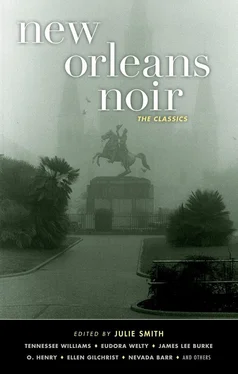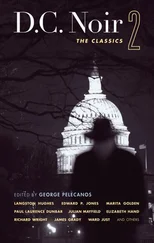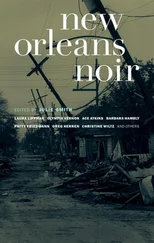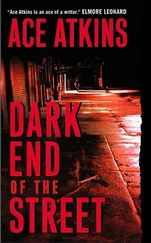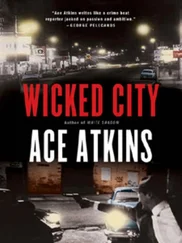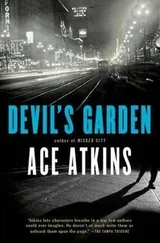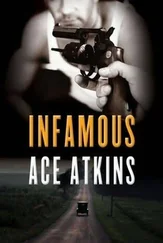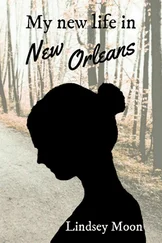Ace Atkins - New Orleans Noir - The Classics
Здесь есть возможность читать онлайн «Ace Atkins - New Orleans Noir - The Classics» весь текст электронной книги совершенно бесплатно (целиком полную версию без сокращений). В некоторых случаях можно слушать аудио, скачать через торрент в формате fb2 и присутствует краткое содержание. Город: New York, Год выпуска: 2016, ISBN: 2016, Издательство: Akashic Books, Жанр: Детектив, на английском языке. Описание произведения, (предисловие) а так же отзывы посетителей доступны на портале библиотеки ЛибКат.
- Название:New Orleans Noir: The Classics
- Автор:
- Издательство:Akashic Books
- Жанр:
- Год:2016
- Город:New York
- ISBN:978-1-61775-384-8
- Рейтинг книги:3 / 5. Голосов: 1
-
Избранное:Добавить в избранное
- Отзывы:
-
Ваша оценка:
- 60
- 1
- 2
- 3
- 4
- 5
New Orleans Noir: The Classics: краткое содержание, описание и аннотация
Предлагаем к чтению аннотацию, описание, краткое содержание или предисловие (зависит от того, что написал сам автор книги «New Orleans Noir: The Classics»). Если вы не нашли необходимую информацию о книге — напишите в комментариях, мы постараемся отыскать её.
takes a literary tour through some of the darkest writing in New Orleans history.
New Orleans Noir: The Classics — читать онлайн бесплатно полную книгу (весь текст) целиком
Ниже представлен текст книги, разбитый по страницам. Система сохранения места последней прочитанной страницы, позволяет с удобством читать онлайн бесплатно книгу «New Orleans Noir: The Classics», без необходимости каждый раз заново искать на чём Вы остановились. Поставьте закладку, и сможете в любой момент перейти на страницу, на которой закончили чтение.
Интервал:
Закладка:
The Negro masseur leaned over his still breathing victim.
Burns was whispering something.
The black giant nodded.
You know what you have to do now? the victim asked him. The black giant nodded.
He picked up the body, which barely held together, and placed it gently on a clean-swept table.
The giant began to devour the body of Burns.
It took him twenty-four hours to eat the splintered bones clean.
When he had finished, the sky was serenely blue, the passionate services at the church were finished, the ashes had settled, the scarlet engines had gone, and the reek of honey was blown from the atmosphere.
Quiet had returned and there was an air of completion.
Those bare white bones, left over from Burns’s atonement, were placed in a sack and borne to the end of a car line.
There the masseur walked out on a lonely pier and dropped his burden under the lake’s quiet surface.
As the giant turned homeward, he mused on his satisfaction.
Yes, it is perfect, he thought, it is now completed!
Then in the sack, in which he had carried the bones, he dropped his belongings, a neat blue suit to conceal his dangerous body, some buttons of pearl, and a picture of Anthony Burns as a child of seven.
He moved to another city, obtained employment once more as an expert masseur. And there in a white-curtained place, serenely conscious of fate bringing toward him another, to suffer atonement as it had been suffered by Burns, he stood impassively waiting inside a milky-white door for the next to arrive.
And meantime, slowly, with barely a thought of so doing, the earth’s whole population twisted and writhed beneath the manipulation of night’s black fingers and the white ones of day with skeletons splintered and flesh reduced to pulp, as out of this unlikely problem, the answer, perfection, was slowly evolved through torture.
Miss Yellow Eyes
by Shirley Ann Grau
(Originally published in 1955)
Pigeon Town
Pete brought Chris home one evening after supper. I remember it was early spring, because the Talisman rosebush by the kitchen steps had begun to blossom out. For that time of year it was cool: there was a good stiff wind off the river that shook the old bush and creaked it, knocked the biggest flowers to bits, and blew their petals into a little heap against the side of the wood steps. The Johnsons, who lived in the house next door, had put their bedspread out to air and forgot to take it in. So it was hanging out there on the porch railing, a pink spread with a fan-tailed yellow peacock in the middle. I could hear it flapping — loud when the wind was up, and very soft when it fell. And from out on the river there were the soft low tones of the ships’ whistles. And I could hear a mockingbird too, perched up on top the house, singing away, forgetting that it was nighttime. And in all this, Pete’s steps in the side alley, coming to the kitchen door.
“Hi, kid!” Pete held open the door with one arm stretched behind him. Chris came in.
I thought at first: That’s a white man . And I wondered what a white man would do coming here. I got a second look and saw the difference, saw I’d made a mistake. His skin wasn’t dark at all, but only suntanned. (Lots of white men were darker.) His eyes were a pale blue, the color of the china Ma got with the Octagon soap coupons. He had brown hair — no, it was closer to red, and only slightly wavy. He looked like a white man, almost. But I saw the difference. Maybe it was just his way of carrying himself — that was like a Negro.
But he was the handsomest man I’d ever seen, excepting none. I could feel the bottom of my stomach roll up into a hard ball.
“This here’s Celia,” Pete said.
Chris grinned and his blue eyes crinkled up into almost closed slits. He sat down at the table opposite me, flipping shut the book I’d been reading. “Evening’s no time to be busy, kid.”
Pete picked up the coffeepot from where it always stood on the back of the stove and shook it gently. “There’s some here all right,” he said to Chris as he reached up to the shelf for a couple of cups. “You want anything in yours? I reckon there’d be a can of milk in the icebox.”
“No,” Chris said. “I like it black.”
Pete lit the fire under the speckled enamel coffeepot. “Where’s Ma?”
“They having a dinner tonight... she said she’ll be real late.” Ma worked as a cook in one of the big houses on St. Charles Avenue. When there was a dinner, it meant she’d have to stay around and clean up afterward and wouldn’t get home till eleven or twelve maybe.
“She’ll get tomorrow off, though,” I told Chris.
“Good enough.” He grinned and his teeth were very square and bright.
They sat down at the table with me and stretched out their legs. Holding the coffee cup to his mouth, Chris reached out one finger and rubbed the petals of the big yellow rose in the drinking glass in the center of the table. “That’s real pretty.”
“Lena’s been putting them there,” Pete said.
“That’s sure the one I want to meet,” Chris said, and grinned over at Pete, and I knew that he’d been talking about Lena.
She was the sort of girl you talk about, she was that beautiful — with light brown hair that was shoulder-length and perfectly straight and ivory skin and eyes that were light brown with flecks of yellow in them. She was all gold-colored. Sometimes when she stood in the sun you could almost think the light was shining right through her.
She was near seventeen then, three years older than I was. The boys in high school all followed her around until the other girls hated her. Every chance they got they would play some mean trick on her, kicking dust in her lunch, or roughing her up playing basketball, or tearing pages out of her books. Lena hardly ever lost her temper; she didn’t really seem to care. “I reckon I know who the boys are looking at,” she told me. She was right. There was always a bunch of them trying to sit next to her in class or walk next to her down the hall. And when school was through, there was always a bunch of them waiting around the door, wanting to take her home, or for rides if they had cars. And when she finally came sauntering out, with her books tucked up under one arm, she wouldn’t pay them much attention; she’d just give them a kind of little smile (to keep them from going to the other girls) and walk home by herself, with maybe a few of them trailing along behind. I used to wait and watch her leave and then I’d go home a different way. I didn’t want to interfere.
But, for all that, she didn’t go out very much. And never with the same boy for very long. Once Hoyt Carmichael came around and stood in the kitchen door, asking for her, just begging to see her. She wouldn’t even come out to talk to him. Ma asked her later if there was something wrong and Lena just nodded and shrugged her shoulders all at once. Ma hugged her then and you could see the relief in her face; she worried so about Lena, about her being so very pretty.
Pete said: “You sure got to meet her, Chris, man.”
And I said to Chris: “She’s over by the Johnsons’.” I got up and opened the door and yelled out into the alley: “Lena!”
She came in a few minutes. We could hear her steps on the alley bricks, slow. She never did hurry. Finally she opened the screen and stood there, looking from one to the other.
I said: “This is my sister Magdalena.”
“And this here is Chris Watkin,” Pete said.
Chris had got up and bowed real solemnly. “I’m pleased to meet you.”
Lena brushed the hair back from her forehead. She had long fingers, and hands so thin that the veins stood out blue on the backs. “Nobody calls me Magdalena,” she said, “except Celia, now and then. Just Lena.”
Читать дальшеИнтервал:
Закладка:
Похожие книги на «New Orleans Noir: The Classics»
Представляем Вашему вниманию похожие книги на «New Orleans Noir: The Classics» списком для выбора. Мы отобрали схожую по названию и смыслу литературу в надежде предоставить читателям больше вариантов отыскать новые, интересные, ещё непрочитанные произведения.
Обсуждение, отзывы о книге «New Orleans Noir: The Classics» и просто собственные мнения читателей. Оставьте ваши комментарии, напишите, что Вы думаете о произведении, его смысле или главных героях. Укажите что конкретно понравилось, а что нет, и почему Вы так считаете.
